Aleksi Perälä’s microtonal compositions are the fruit of an assiduous research between ancestral music, natural phenomena, frequency experiments and candid spontaneity aiming to approach ever more the original harmony of Human and Nature. A concept named Colundi that he describes with fervor.
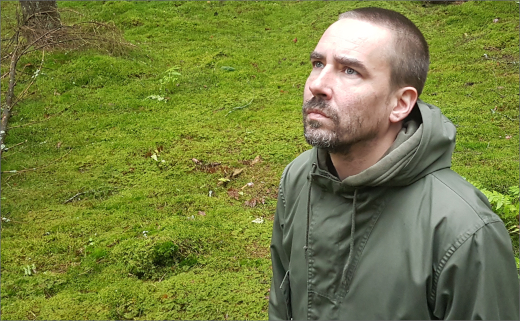
The original harmony of Human and Nature
Revealed on Aphex Twin and Grant Wilson-Claridge’s Rephlex label, confirmed on those of Nina Kraviz or Len Faki, author of more than 90 albums in 22 years of career (not counting EP’s), one can no longer ignore the enigmatic Finnish electronic producer Aleksi Perälä, also known as Ovuca. His microtonal compositions are the fruit of an assiduous research between ancestral music, natural phenomena, frequency experiments and candid spontaneity aiming to approach ever more the original harmony of Human and Nature. A concept named Colundi that he describes with fervor.
Igloo :: How old were you when you became interested in making music?
Aleksi Perälä :: It probably started gradually but I was 12 years old when I started making music around 1988. I played piano first. I went to a piano lesson and my teacher had a synthesizer around. She was making wind sounds on the synth and I was like “What is this? This is amazing. I want one!” That’s when I gave up piano straight away and started saving money to get my own synthesizer.
What kind of music were you listening to back then?
Well, I was interested in electronic music as soon as I heard any, but growing up in Finland, it wasn’t around much. And so, whatever I heard on the radio I would tape. And then, as I was really into that sound, I wanted to make some myself just to hear more, (laughs) because there wasn’t enough of that around and I was also quite young and living in the middle of nowhere, so…
Then you signed to Rephlex in 1999?
Yeah, I was in Michigan for a year as an exchange student, heard Aphex Twin there for the first time and found out that he had his own label. So when I got back to Finland, I started sending demo tapes to Rephlex and then, after about five years, they got in touch and that’s how it started. So it was a slow process.
How did you get the name Ovuca?
I put my favorite letters on a piece of paper and started making up words using those letters and that’s how I came up with Ovuca.
But it doesn’t mean anything specific to you?
No, it’s just that I liked the idea of having a new word. And the beauty of that is when you do, say, a Google search, you’re guaranteed that every match is related to you or the origin of the name. Although there was a nightclub in, I think, Barcelona called Ovuca later on.
You should go there!
Yeah, I know, but I’ve never been. It’s probably not there anymore, but for a while it was.
Then in 2001, you changed your name to Astrobotnia although still on Rephlex.
Yeah, that was because Ovuca was about using hardware synthesizers and drum machines and so forth for making music. And then Astrobotnia was when I got my first laptop and started making music on a computer. So I thought it would make sense to start a new name for computer music.
You did Cylobotnia in collaboration with Cylob in 2003. It seems that it was your only released collaboration so far. Are there more? And do you wish to collaborate with more people?
Yeah! It would be fun. I have jams with my friends and stuff, but yeah, I guess we haven’t released anything yet. Or not much. Maybe a few secret things but nothing major.
A question of what gets released and what doesn’t ::
Then you released Project V in 2007? What were you up to between 2003 and 2007?
Making music as usual! I lived in London for a year in 2003 then moved back to Finland and started studying music technology. I was glad to do that because I learned some stuff that I wish I had known before I started to make music. After Astrobotnia, I wanted to change direction a little bit and I guess that’s why it took a while. There were a few years’ gap in releasing. As I said, I’ve made music since 1988 and I’ve always made as much music as I do now, it’s just a question of what gets released and what doesn’t. I have boxes full of tapes and minidiscs and stuff from the early days. I haven’t even listened to them but I should go through those one day. That’s for my retirement or whatever. My beginning of making electronic music was quite different from the stuff that I do now.
You released many outtakes of the Ovuca and Astrobotnia years in 2011. It sounds like you were closing a chapter before moving on to something new. Is that what it was?
No, not really. I mean, Ovuca’s still going, I like to keep that project alive. Astrobotnia may be a bit different. I don’t think I will be going back to Astrobotnia, but then again, what do I know? Never say never. (laughs) It’s nice to keep things a bit open, you know.
Then you started your label, AP Musik, in 2013.
Yeah, it was at the end of Rephlex that I started AP Musik, with the help of my dear friend Grant Wilson-Claridge from Rephlex. AP Musik is like a sublabel of Rephlex or that’s still what I consider it to be. Grant selects everything that I put out or I run everything by him just to have someone look after this madness. (laughs) But it’s a really seamless cooperation in terms of that we are really like-minded and there’s hardly ever any disagreements about anything. Like, for an album, I’ll send him a bunch of tracks that I’ve pre-selected myself so I don’t send him any crap (laughs) or try not to, and then he goes through it and yeah, he might drop one track or so but… it works really well.
Then, Colundi started around the same time as AP Musik.
Yes.
Did that start as Grant’s project or yours? Or was it the two of you?
Well, for years, I was really interested in different tuning systems and using frequencies a bit more freely, and having an open mind for that, and trying to maybe break free from standard keyboard or standard musical instruments.
The Well-Tempered Clavier.
Yeah, well, the 12-TET system. I experimented with, I think I started with 33 hertz, which is the same as 528 hertz [4 octaves up], which is quite known to humanity at this point, so I used those frequencies for a school project in 2006 and one track ended up on a release in 2009. (“The Moon,” last track on the Boom Blaster EP on Rephlex]
Why did you choose to use these specific frequencies?
That’s a very good question. Because they felt good. I wanted to explore that. And also, at that point — 2005 or 2006 — I had been making music for a while already, like 15 years or so. I felt like it was time to try something new and that led on to different projects, different experiments on trying to widen that. Where do I go from 33 / 528 hertz? I add more frequencies! So I went through different tuning systems and how many notes per octave, started with 1 and went gradually through all of them to 16, maybe I had 24 even, but yeah, just as an experiment. Then, after that, in 2011, when the first Colundi stuff came out, that was like it just happened quite naturally, in like I was ready to try something new, and then Grant had made his own research and he was like “OK, we want to maybe try these frequencies (laughs) as the next thing to do” and it just blew me away how important it was to start from there, to start with these frequencies, to start with how sound is affecting the human body.
I have sometimes chatted with Grant about that but he seemed unable to explain exactly what it was, he just sent me tons of links to all kinds of things. It seems that his approach is more based on established human and natural elements, equinoxes, the Schumann resonance, etc. — whereas it seems that your approach is more personal, more a matter of your own taste in frequencies, isn’t it
Yes, it is. I am just one guy making music. I don’t have many people to collaborate with me and go through these frequencies and see what works with them and so forth. I’m quite a lone soul in that way. I like working by myself, and I feel like yeah, as you said, it’s very personal, but also, with that, it is easier to find something universal within yourself, like you have the universe inside yourself. So it works both ways. Like it is the one and the oneness—but that becomes the universe. It’s the same thing in the end. I found that that works for me. That’s my personality. And yeah, it’s still an ongoing research on a daily basis. My most used instrument is the pocket calculator, I use it as much as I use my synths and samplers and drum machines. I find it intriguing every day, it hasn’t stopped.
“You’re the operator with your pocket calculator.”
Yeah, yeah. (laughs)
Then the Colundi Sequence series came out in 2014. Therefore, was that a mixture of your own taste and Grant’s personal findings or just your own stuff?
I would say that the frequencies are his findings, so that’s creating the foundation on which I am then composing music.
That’s for the Colundi Sequence series but also for the others?
They are just names. To me, it doesn’t make any difference whatsoever. I would say that that 33 / 528 hertz project in 2006 was the starting of Colundi for me. Although I have to say that I found a track from 1994 or 1995 that’s a Colundi track that I had made back then, just veeery minimal stuff.
Have you released it?
No, no, but I think I had it on my website for a while, but not anymore. I’m not very organized so I don’t know!
Do you remember its name?
No… (laughs)
It’s not gonna help. (laughs)
Yeah, there’s so many tracks and I have a really bad memory, but it’s somewhere! But anyway, just to say that it’s been a really, really long ongoing project and I wouldn’t distinguish the Colundi Sequence as being specifically Colundi. Everything I do is Colundi since the beginning of the Colundi Sequence, so it’s just like different approaches to Colundi. I’m quite into a different research at the moment, or different approach.
Since 2014, there’s been an absolutely crazy outpour of releases. For the past two years only, 2020 and 2021, I’ve counted 33 albums and EP’s so far.
Yeah, it’s mental. I need to apologize!
No, (laughs) but an obvious question is: aren’t you afraid that it can be counterproductive to release too much at once?
No, not at all, no. Because I don’t think about stuff like that. I never think about stuff like my career or something. I’m not that kind of a person. I’m more like a nature child or whatever. I just do what I’m supposed to do. Or “what is my place in this universe?” I am just following my calling, it’s natural to me.
But I mean, aside from the business side of things, aren’t you afraid that some really good tracks are going to get lost in an ocean of other tracks?
They already are! (laughs) It’s already too late… No, I don’t mind anymore. It’s like life: we have so many things, humans produce so much already. Where do you draw the line? I am just really enjoying what I do. And I like to share it. Simple as that. Smile with the universe!
So another obvious question is: how do you do to make so much music? Do you have a specific work routine, a rigorous work ethic?
Well, yeah. (laughs) I make music every day. That’s my routine.
Like how many hours roughly?
12 hours a day sometimes. That’s all I do. And I find it’s my thing to do. At least what I should be doing. I’ve had numerous day jobs in my life, and when I’m at work, I always feel like I should be in my studio making music instead, that it would be more beneficial for the universe or myself or whatever, it just feels more… It feels right.
But if you spend 12 hours per day on music, how many hours do you work on the side? When do you sleep?
(laughs) Oh, I haven’t had a day job for a while now. I quit my day job a couple of years ago.
That’s why we have so many releases now. (laughs)
Yeah, we have so many releases now because of the pandemic, really, that’s affected things a lot because since the outbreak started, I haven’t played any gigs and that used to keep me busy. It takes a lot of time and commitment to play gigs, to prepare for each set. And then, there is all the traveling and so forth, and since the pandemic, I’ve just been at home in my studio every day, all day, this is what happened.
Can you still manage a social life on the side?
Well, yeah, that’s a difficult question. I lived in the UK for 10 years and then, a couple of years ago, I moved back to Finland and I’m still trying to find my place here, like most of my friends were in the UK so it’s not that busy here. I have a lot of time to myself.
Are you planning on moving to another country?
Well, my wife’s Canadian. So, if anywhere, it would be Canada, I think. It’s kinda difficult to move to the UK now. Yeah, it’s not as easy as it was. That’s a shame.
When you make all this music, there’s a time when you have to release it. How do you choose under which moniker it should go?
There’s not a huge difference, I guess.
You’ve brought the name Ovuca back this year.
Yeah… because, as the pandemic started, I went back to using hardware. I had been making everything on a computer since the Astrobotnia days — summer of 2000. All of that was made on a computer until a couple of years ago I went back to hardware, and the first stuff that I made on hardware, learning to use it, I felt adequate to call it Ovuca, as Ovuca was always about making music on hardware, not on a computer. I hadn’t made music on hardware for such a long time, I felt like “OK, this is like going back to square one, starting afresh“, and I felt like “OK, Ovuca is quite fitting for that.” That’s the only explanation. It came out later but the Ovuca stuff that I released this year I have made last year. So a bit earlier but yeah, it doesn’t matter.
You have very similar track names on each release. Do they refer to anything specific?
Yeah, absolutely. The track titles are the ISRC codes. And because there are so many tracks, it also makes it a lot easier. Then I can copy/paste (laughs) the ISRC code, and as there’s hundreds of tracks, I would run out of ideas for what to call this and that. And ISRC codes are kind of simple or easy in terms of you can see which year it came out, which cat[alogue] number it is on and which record label — it’s all in the name, so that’s quite handy in a way. Although I know it’s a nightmare, they all look the same and so forth. I’ve had a lot of feedback on that.
How about the tracklisting order? Does it matter to you so much?
Of course, yeah. But then I get massive help from Grant with that. He is the master of compiling albums, putting tracks in the right order, although I sometimes do it myself and sometimes he does it. He does it more than I do. But again, we agree on everything, most of the time.
Eco-friendly ::
Since 2017, you started to release music on other labels, too. Is that a way to open up to a different audience?
I don’t know… I don’t see that myself. With the climate change, I’m very, very aware that what I’m doing should be as eco-friendly as possible, so pressing up a vinyl record is not exactly necessary, is it? I mean, I know it’s nice, and people appreciate that, but it’s 2021. We’ve done so much harm to this planet that if I can sell my music online, that tiny bit makes me feel a bit better, but those tracks are not being pressed on vinyl because it’s not really necessary. You can listen to the tracks without that process if you just download them, as streaming is not so good.
And that goes on… I know that my carbon footprint is huge because I’ve played gigs internationally for 20 years, I’ve sat on the plane a lot and I feel guilty, I feel conscious of that and I don’t think that I can carry on doing that. I mean, I’ve got nothing coming up but the next time I go do a gig, I’m sure that I’ll be going there by train, or not play so many gigs, or do a mini tour to decrease the impact on the environment, just to make it a bit more eco-friendly if possible. But at the same time, I’m living on the outskirts of Europe and it’s a long, long way to go anywhere so I guess most of my gigs would be in Central Europe or so. But yeah, my thinking is that I’m not gonna fly there anymore. I know that people are going to fly around loads, (laughs) and my little decision won’t help much, but if that’s all I can do, then that’s what I am going to do. I was hoping, when the pandemic started, that people would stop and reflect on what we’ve been doing and sort of wake up a little bit.
Yeah, it didn’t last long.
Yeah, it’s very sad to see that, like we are rushing back to destroying the planet.
Yeah, it’s human nature.
Oh, well, I hope that there’s a better way, that we can change it. Humans are amazing. We are the stars on this planet. We should be more aware of this. We should all be living together as one.
Well, people love to have their comfort and travel.
Yeah, it’s difficult to change if you’re used to something. It’s a very big fundamental question. It starts with going to work. Most people have day jobs, they’re spending their days doing something that they kind of have to do to pay the rent or pay their mortgage or to get by. They do a job that they don’t necessarily love 100% doing but they think they have to do that and I think that is wrong. I think people should be doing what they love to do out of love. It’s like we are slaves to money, and to break free from that is a long, long process but I hope that we can do it one day. And, you know, people having jobs that they don’t enjoy doing leads then to “OK, let’s travel, let’s fly somewhere to get out of this, to at least have a couple of weeks of something nice.” And that’s the comfort. And then, you have money that enables you to do that and so forth, but maybe there is another way: the way of Love.
Is that something you’re trying to achieve through making music?
Yeah, definitely. Love is the way but, you know, I’m just doing what I feel right. These are very, very difficult questions. I live in my own little universe, my own little bubble. What do I know? What do I understand of human nature? I’m not a sociologist, that’s not my field at all, but at the same time, I feel this every day and I’m conscious of it and I feel bad about it. So, if I can make something good to this world with music, then great, that makes me happy if I can do something good.
You’re probably one of the only artists who releases his music on 24bit and 192khz, which is actually rare.
Yeah… I had to go to 96khz now because Bandcamp has a limit. The files become so big. And also, there again, I’m thinking about the environment and thinking maybe it’s a bit too much. You know, even file sizes are, environmental, like server space, electricity… everything costs to the environment.
Colundi Sequence aside, you’ve done your longest series in the past three years with Spectrum, Northern Lights, Midnight Sun and Phantasia. How do you differentiate them? Do you have specific themes that you attribute to them?
Yeah. The Ovuca one, Northern Lights, was the beginning of making music on hardware again, so that was that. And then, Midnight Sun was all for Finland, the Finnish nature and the beauty here and the fact that we have something called “midnight sun” up here. At midsummer, you have to go to northern Finland to actually witness the midnight sun. With my wife, we went to see it last summer, it was awesome. I don’t think people realize that very much. I get the impression whenever I’m in Central Europe that people seem to think of Finland as a cold and dark place, which it is in the wintertime, but in summer, it’s the opposite. We have more light than the rest of Europe and it can be very hot up here as well. I remember playing in Portugal at a festival in the summertime. It was really hot here in Finland, I left my house in a T-shirt thinking “I’m going to Portugal, it’ll be fine.” I was freezing in Portugal. (laughs) Then I come back here and it’s like really hot again.
(laughs) How about Spectrum and Phantasia?
Spectrum, that was earlier, that was the end of the computer music and the transition to hardware gradually — it’s mainly computer but it’s kind of a mixed bag. There’s some drum machines in there and stuff, and Phantasia was all about playing, like, quite melodic and playful, like inspirational stuff, like, not planned, just having a jam and enjoying it. That’s the whole idea of that.
And it’s all hardware.
All hardware jams, yeah. And I got back into playing ! It’s fun making Colundi music because I can’t use a traditional keyboard and I don’t like to. Like a piano keyboard would just be messing me up, so I use the [Akai] MPC and Force and so forth, I have all the keys and it’s just been so much fun. I like to play, I try not to record so much these days but I just go and enjoy playing music. The beginning of my music making was playing the piano so I’m used to that, I just use my fingers again for as long as I can, and that’s been Phantasia. There’s a couple more Phantasia albums coming out like Phantabla, I call them. More tabla sounds, another Indian percussion. And then there’s another series, like 10 albums or more, called Cycles. And also, sound-wise, I think Phantasia is more about the exploration on world music instruments. It goes further on Cycles.
Different instruments ::
I’ve been wondering for the past few years what would feel really new to do. The way to go is probably back to ethnical instruments and use them in new ways rather than just the electronics as there’s something more organic in there.
Absolutely! For the past couple of years, that’s been my daily research to learn more about Asian instruments, different instruments. I could talk about this for hours. The Karen bronze drum, for example: an instrument I didn’t know about and I just absolutely love the sound and the story of that, like how important that instrument was for the people, and how it was used in everything like agriculture, their daily lives. A frog drum they’re sometimes called because, quite often, they have frogs [sculpted] on them. There’s a couple of YouTube videos on that but I haven’t heard the original sound being played properly. There’s a really, really good book by Thomas Rossing called The Science Of Percussion Instruments. That book is very analytical on different percussive sounds and explains how they come about, and what is great about Thomas Rossing is he always gives you the ratios on the fundamental frequency and then the upper partials of the sounds, because quite often with ethnical percussion instruments, they’re not harmonic in the traditional sense but they have partials that are much more interesting. It’s like breaking free from your standard saw[tooth] wave or square wave or so forth.
So for the past couple of years, I’ve been really into marrying Colundi with these instruments and making Colundi sounds based on these instruments, so I use the same harmonic ratio and convert that to the Colundi frequencies and then I have my own sound made of sine waves. The origin of the sound is the original. Mostly, Asian sounds have been my latest interest, some African percussion as well, a lot of that, but yeah, there’s a lot of interesting discoveries there. Like, in the late 70’s, in China, the discovery of the tomb of Marquis Yi. Anyway, I found a white paper on that where they had looked into the tunings of those bi-tone bells that are thousands of years old and I converted the tunings to hertz just to see if they’re close to Colundi at all. Well, not a big surprise but very nice to see that some of them were bang-on Colundi frequencies. So in ancient China, they were using Colundi back then. It’s great to have some sort of confirmation that Colundi has been there for a long time and we’re just bringing it back.
But you still favor your own preferences in frequencies.
Yes, of course, absolutely. Currently, I’m stuck to about 64 of the Colundi frequencies that I use every day. And really, they make me feel good every day and I like using them, and I kind of have to use them now because if I don’t, I get a physical reaction or a headache or something. I don’t listen to much of other music anymore because I’m so deep into this. I do really long days of doing this, so I am quite tired or my ears are tired after a day in the studio, so it’s just like I don’t have time or energy to listen. I love a lot of music but yeah, it’s just like the path that I am on. Quite often it feels there aren’t enough hours in a day.
Are there any Finnish electronic artists that you’ve enjoyed, that have had an impact on you?
Yeah, absolutely. To begin with, Sähkö Recordings was a huge source of inspiration right in the beginning, so that was, you know, in 1994, and later I met all the Sähkö guys, although I don’t really know them well, personally. I don’t know many people in Finland in general. I used to go to all the early raves in Finland and so forth. But then, of the latest things in Finland, I would say Morphology were my favorite to see live. I had just moved to Finland and a friend of mine invited me for a gig in Helsinki. I didn’t know about Morphology, and I went to that gig and I loved it. I was like “What ?!” It’s like a bit of Detroit in Helsinki. So yeah, it was great. I think it’s a very small scene here, I guess it’s a small country, only 5 million people, so the percentage of having many Colundi lovers here is probably quite small.
Is there more ambient, Colundi stuff to be released?
Yeah. I really need to do like another meditation album, like drone stuff. There is one as part of Cycles, the album series coming out. It’s older now, it just hasn’t come out. There’s an ambient album at the end of it. And then, there’s another one that I’m kind of saving. I don’t know why, it’s like I’m saving it for a rainy day or something. It’s good to have some things.
Is there going to be a recording of your Warehouse Project set that you did two years ago in Manchester alongside Aphex Twin and Nina Kraviz?
Oh, no… I haven’t even thought of it… I guess sometimes people record them but I don’t record my gigs. I’m sure there’s a couple on Soundcloud already and I know that there’s a few that are still to come out, but yeah, I don’t really think about stuff like that.
Are you making plans to play live again? Preparing for a live setup or anything?
Yeah, I guess so. I just haven’t really thought about it. (laughs) And it’s been very liberating to be free from that after 20 years of playing gigs because all of a sudden, I’ve got no gigs coming up, nothing. I love it ! (laughs) I mean, don’t get me wrong, I really miss all the golden people that I’ve met at gigs over the years. I really miss them a lot, but then I don’t miss sitting on a plane and all the rest. And it’s been liberating to be in the studio and not having to think about performances because it’s just gonna take me a while to rig my brain for playing live gigs again. (laughs) I love to use samples, like I love to make sounds and then sample them and then play them. I’m really into sampling and that’s a full time job as well. I got a couple of Moog DFAM analog synths and I love having triangle waves in their pure analog form, but tuning these things to Colundi frequencies (laughs), it takes a while ! And then it’s good for that one track, and it’s another thing having a jam here at home with it. If I play a gig now, I’d love to bring them with me, but then, I have to figure out how to do it to play many tracks. I mean, of course there are ways, there are different ways of doing stuff. There is always a way.
Phantabla I is available on Bandcamp. [Link]






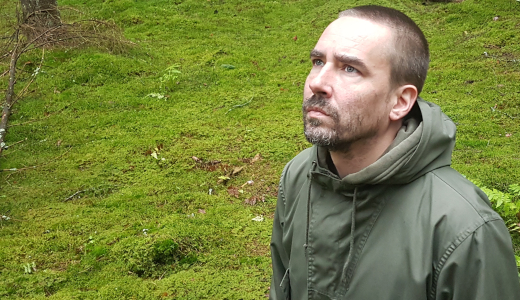
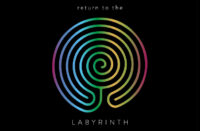


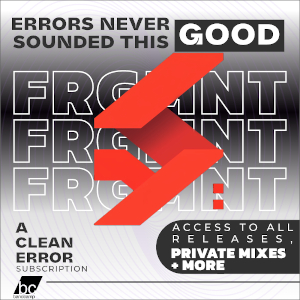
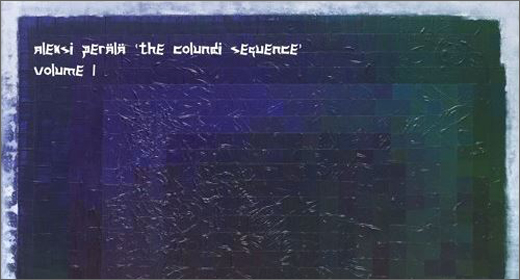

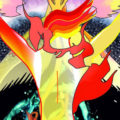
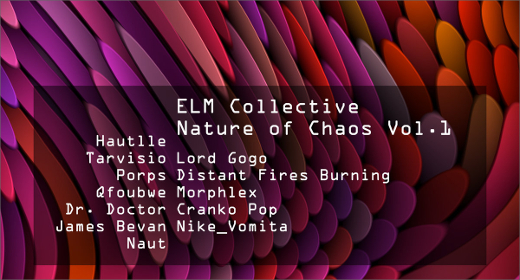
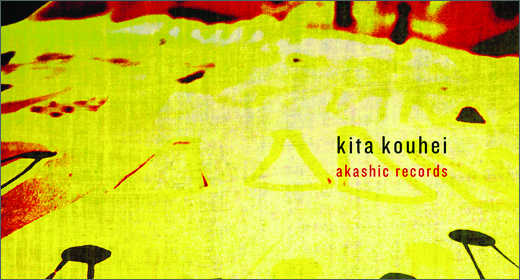


![Pole :: Tempus Remixes (Mute) — [concise]](https://igloomag.com/wp/wp-content/uploads/2025/04/pole-tempus-remixes_feat-75x75.jpg)






![Hasbeen :: Bunker Symphonies II (Clean Error) — [concise]](https://igloomag.com/wp/wp-content/uploads/2025/04/hasbeen-bunker-symphonies-ii_feat-75x75.jpg)

